
Kogi State is a state in the North Central region of Nigeria, bordered to the west by the states of Ekiti and Kwara, to the north by the Federal Capital Territory, to the northeast by Nasarawa State, to the northwest by Niger State, to the southwest by the Edo and Ondo states, to the southeast by the states of Anambra and Enugu, and to the east by Benue State. It is the only state in Nigeria to border ten other states. Named for the Hausa word for river (Kogi). Kogi State was formed from parts of Benue State, Niger State, and Kwara State on 27 August 1991. The state is nicknamed the "Confluence State" due to the fact that the confluence of the River Niger and the River Benue occurs next to its capital, Lokoja.

The Sokoto Caliphate, also known as the Sultanate of Sokoto, was a Sunni Muslim caliphate in West Africa. It was founded by Usman dan Fodio in 1804 during the Fulani jihads after defeating the Hausa Kingdoms in the Fulani War. The boundaries of the caliphate are part of present-day Cameroon, Burkina Faso, Niger, and Nigeria. By 1837, the Sokoto state had a population of around 10-20 plus million people, becoming the most populous empire in West Africa. It was dissolved when the British, French and Germans conquered the area in 1903 and annexed it into the newly established Northern Nigeria Protectorate, Senegambia and Niger and Kamerun respectively.

Northern Nigeria was a British protectorate which lasted from 1900 until 1914, and covered the northern part of what is now Nigeria.

Southern Nigeria was a British protectorate in the coastal areas of modern-day Nigeria formed in 1900 from the union of the Niger Coast Protectorate with territories chartered by the Royal Niger Company below Lokoja on the Niger River.

Northern Nigeria was an autonomous division within Nigeria, distinctly different from the southern part of the country, with independent customs, foreign relations and security structures. In 1962, it acquired the territory of the British Northern Cameroons, which voted to become a province within Northern Nigeria.
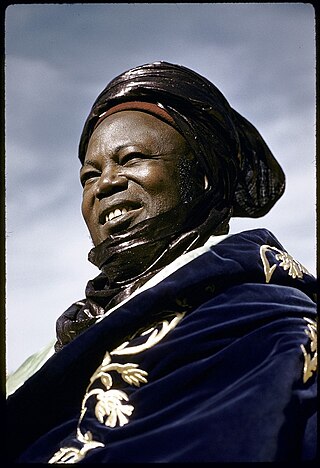
Ahmadu Ibrahim Bello, famously known as Sardauna of Sokoto, knighted as SirAhmadu Bello, was a conservative Nigerian statesman who was one of the leading northern politicians in 1960 and served as its first and only premier from 1954 until his assassination in 1966, in which capacity he dominated national affairs for over a decade.

Colonial Nigeria was ruled by the British Empire from the mid-nineteenth century until 1 October 1960 when Nigeria achieved independence. Britain annexed Lagos in 1861 and established the Oil River Protectorate in 1884. British influence in the Niger area increased gradually over the 19th century, but Britain did not effectively occupy the area until 1885. Other European powers acknowledged Britain's dominance over the area in the 1885 Berlin Conference.
Arewa or Arewaland is a Hausa word which means "The North". The term is used to refer to Northern Nigeria general. The terms Arewa and Arewacin Nijeriya are used in Hausa to refer to the historic region geopolitically located north of the River Niger.
The continued use of the term, Arewa ... has conjured up an image among educated Northerners that resonated far beyond the institutional structures Sir Ahmadu Bello created: the successor to the Bornu and Sokoto Caliphate; the vision of God's Empire in the region; the universality of its claim to suzerainty; and in a more prosaic but no less powerful sense, the concept of a polity with an emphasis on unity and sense of shared purpose in northern West Africa beyond the popular slogan--'one North, one People'.
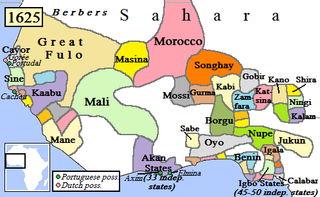
Nigerian traditional rulers often derive their titles from the rulers of independent states or communities that existed before the formation of modern Nigeria. Although they do not have formal political power, in many cases they continue to command respect from their people and have considerable influence in their community.
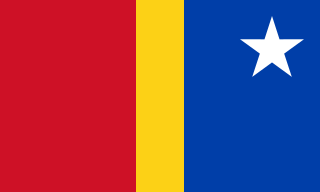
The Kano Emirate was a Muslim state in northern Nigeria formed in 1805 during the Fulani jihad when the Muslim Hausa-led Sultanate of Kano was deposed and replaced by a new emirate which became a vassal state of the Sokoto Caliphate. During and after the British colonial period, the powers of the emirate were steadily reduced. The emirate is preserved and integrated into modern Nigeria as the Kano Emirate Council.
The Kontagora Emirate is a traditional state with the capital city of Kontagora, Niger State, Nigeria. The Kontagora Emirate is among the major emirates in Niger state like Kagara Emirate, Suleja Emirate and others
The Kebbi Emirate, also known as the Argungu Emirate is a traditional state based on the town of Argungu in Kebbi State, Nigeria. It is the successor to the ancient Hausa kingdom of Kebbi. The Emirate is one of four in Kebbi State, the others being the Gwandu Emirate, Yauri Emirate and Zuru Emirate.
Muhammadu Attahiru I was the twelfth Sultan of the Sokoto Caliphate from October 1902 until March 15, 1903. He was the last independent Sultan of Sokoto before the Caliphate was taken over by the British.

The history of Northern Nigeria covers the history of the region form pre-historic times to the modern period of Northern Nigerian state.

The government of Northern Nigeria was modelled after the Westminster system. A premier acts as head of government and presides over the day-to-day affairs of government, while a governor acts as head of state and commander-in-chief of the constabulary. The Lower house of parliament, called the House of Assembly, is composed of elected representatives from the various provinces of the country. The Upper house of parliament, called the House of Chiefs, is similar to the British House of Lords. It is composed of unelected emirs of the various Native Authority Councils of the nation's provinces. Before 1963, the Queen of the United Kingdom served as the sovereign of Northern Nigeria.
The Battle of Kwatarkwashi was a decisive battle between the British administered Protectorate of Northern Nigeria and forces of the Sokoto Caliphate's Kano Emirate. The defeat of the Kano cavalry in the battle marked the formative end of the Kano Emirate.
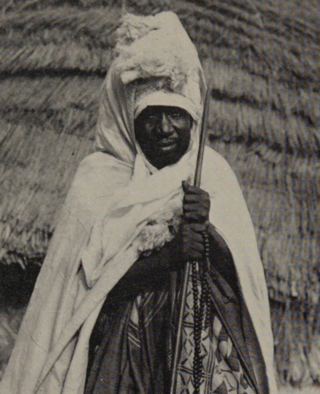
Aliyu Ibn Abdullahi-Maje Karofi was an Emir of Kano, a state in what is now Northern Nigeria. Also known as Babba and Mai Sango- The Gun User. Emerging at the end of the Basasa, his reign was marked by a series of costly wars and fortification projects that heavily militarised the erstwhile commercial Emirate. His escapades as Emir of Kano were recorded in the official historical canon of the Kano Emirate, the Tarikh Al Kano. The ballad of Ali Zaki, commemorates his reign as the last Emir of Kano.
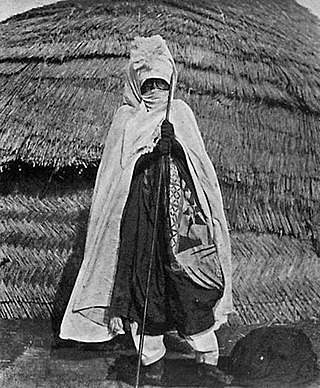
Muhammad Abbas was a regent and later emir of Kano. He was appointed regent by Lord Lugard after the pacification of Northern Nigeria, he presided over the transformation of the caliphal emirate into an emirate subject to the British throne under the Protectorate of Northern Nigeria.

The Sultanate of Sokoto is a traditional state in Northern Nigeria with headquarters in the city of Sokoto, capital of the modern Sokoto State. Preceded by the Sokoto Caliphate, the council was formed in 1903 after the British pacification of the caliphate.
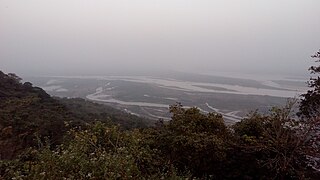
The Mount Patti Hill is a 1503 foot-tall mountain and tourist attraction in Lokoja, Nigeria. It is famous for being the place where British journalist and writer Flora Louise Shaw gave Nigeria its name.













